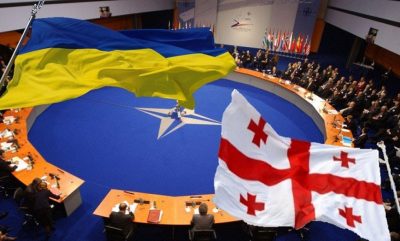Georgia and Ukraine Joining NATO Will Likely Have the Opposite Effect Against Russia

Back in April, during a ministers of the North Atlantic Treaty Organization (NATO) meeting in Washington, it was agreed that a package of measures to strengthen support for Georgia and Ukraine, particularly in the area of maritime defense, would be made.
“We agreed on a package of measures to improve our situational awareness and to step up our support for both Georgia and Ukraine in areas such as the training of maritime forces and coast guards, port visits and exercises and sharing information,” NATO Secretary General Jens Stoltenberg said, while NATO ships were simultaneously conducting naval exercises with Ukraine and Georgia in the Black Sea.
There is little doubt that there is the long-term goal of bringing Ukraine and Georgia into the NATO alliance as a three-pronged attack against Russia in the attempt to isolate and pressure the Eurasian Giant:
Both Ukraine and Georgia are Black Sea states, along with Romania, Bulgaria and Turkey who are already NATO members. The Black Sea is the location of Russia’s warmwater ports, i.e. its access for year-round trade with the international community.
Although Russia’s Kaliningrad Oblast is completely surrounded by NATO members Poland and Lithuania, and fellow NATO members Norway, Estonia and Latvia share small land borders with Russia, a Ukrainian admittance into the alliance will be the biggest encroachment by NATO against Russia since the infamous February 1990 promise made by then-U.S. Secretary of State James Baker who made “iron-clad guarantees” to Soviet President Mikhail Gorbachev that NATO would not expand “one inch eastward,” if the Soviets supported the reunification of Germany. This was obviously a lie.
Georgia will become a Caucasian salient, on the fringes of where Europe becomes Asia, in the attempt to surround and isolate Russia.
However, both Ukraine and Georgia face significant obstacles as they have unresolved territorial dispute: Ukraine with the Lugansk People’s Republic and the Donetsk People’s Republic, and Georgia who does not recognize the independence of Abkhazia and South Ossetia despite the reality that these states have achieved sovereignty. So long as the sovereignty and independence of South Ossetia and Abkhazia, and the status quo of Donbass remains unresolved, there is little chance Ukraine and Georgia will be able to join NATO with European member states unwilling to go to war with Russia for the sake of these two countries.
As L. Todd Wood, a former special operations helicopter pilot, said in an opinion piece published in the Washington Times in November last year,
“Ukrainians and Georgians are good people and deserve our support to realize their dreams. But it’s time to stop with the creeping borders of the alliance. Moscow […] declared that if Georgia or Ukraine joined NATO, Russia would be “forced to act.” I take that threat at face value. Frankly, they have no choice. Any self-respecting Russian leader would have to react or resign.”
Perhaps this is exactly what the U.S. wants though? The Soviet Union, the reason for the establishment of NATO to begin with, is long gone and will not return. This calls into question the purpose of NATO today, and it comes down to two U.S. self-serving reasons:
The desperate prevention of a new Multipolar World Order, which Russia plays a critical part in. It is for this reason that China has now also been identified by NATO as a “very strong competitor.” However, Russia’s defense of South Ossetia in 2008 and the Chinese Belt and Road Initiative has already indicated that the era of unipolarity has come to an end.
To ensure that the U.S. Military Industrial Complex maintains a monopoly on arms sales to the 29-member alliance. The addition of Georgia and Ukraine to NATO will force these countries to spend at least 2% of their GDP on their military, in which U.S. military manufacturers will benefit from.
Any Ukrainian-Georgian admittance into NATO will undoubtably create problems for Russia as it will have to increase its defense spending and it would signal the final eastward expansion onto large swathes of Russia’s European borders. Realistically though, NATO is fractured as never seen before. It is unlikely that Georgia and Ukraine will join the alliance anytime soon, especially as mentioned, it is unlikely European states will want to risk a conflict with Russia over them despite what Washington may want.
In turn, Moscow has its own options to utilize against Georgia and Ukraine such as deepening military support and ties to Donbass, Abkhazia and South Ossetia. Also, as done in the Autonomous Republic of Crimea and the local government of Sevastopol in 2014, referendums could be conducted in Donbass, Abkhazia and South Ossetia to determine if these republic’s want to join Russia. With this trump card (trump being used unironically), by Ukraine and Georgia joining NATO, they could be further weakened by the potential expansion of Russian territory through legal means.
In this light, although Georgia and Ukraine have the goal of joining NATO in the belief that it will help defend their interests against a so-called Russian aggression, it is likely to have the opposite outcome.
*
Note to readers: please click the share buttons above or below. Forward this article to your email lists. Crosspost on your blog site, internet forums. etc.
This article was originally published on InfoBrics.
Paul Antonopoulos is a Research Fellow at the Center for Syncretic Studies.
Featured image is from InfoBrics

